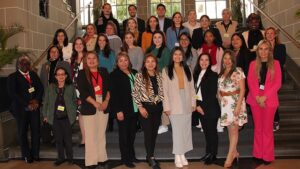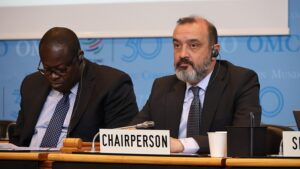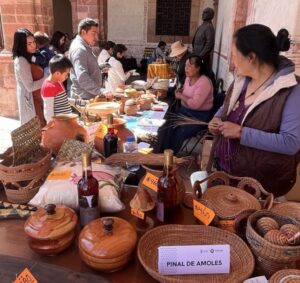Los Miembros de la OMC analizaron las prescripciones en materia de contenido nacional en el Comité de MIC

En una reunión del Comité de Medidas en materia de Inversiones relacionadas con el Comercio (MIC) celebrada el 6 de junio de 2019, varios Miembros de la OMC plantearon preocupaciones sobre las prescripciones en materia de contenido nacional impuestas por otros Miembros. Algunas legislaciones nacionales relativas a la pesca, los dispositivos móviles y médicos, los productos de venta al por menor, los automóviles y los productos farmacéuticos podrían infringir las normas de la OMC, según algunos Miembros.
China – local content provisions on cybersecurity measures
The United States, the European Union and Japan said that China’s local content requirements on goods related to cybersecurity measures restrict the ability of Chinese companies to procure the technology of their choice and reduces market access for foreign investors. This would be a violation of China’s WTO obligations to treat domestic and imported goods equally, also known as the national treatment principle, the members said.
A requirement for companies to purchase or use products specified in terms of local production is prohibited by the TRIMs Agreement and by the 1947 General Agreement on Tariffs and Trade Article III.
The United States asked China to clarify how the new draft measure encompasses its concerns raised in previous meetings of the committee. The issue was first raised in June 2016.
China said this measure is motivated by national security, economic, public safety and health reasons and is not meant to restrict market access for foreign companies. China added that by having solicited public opinion throughout the drafting process, it was complying with its obligation of transparency stemming from WTO agreements.
Indonesia – localization measures, including for pharmaceutical and medical devices
The United States expressed concern that certain objectionable measures remain in place after nearly ten years of discussions and have been complemented by new measures, including for pharmaceutical and medical devices. However, it welcomed Indonesia’s recent commitment to review the measures in a comprehensive manner. The measures apply to the energy (mining, oil, gas and solar in particular), industry, telecommunication, agriculture, pharmaceutical and retail sectors.
The United States urged Indonesia to reconsider the measures so as not to restrict the flow of foreign goods to the country, including from other developing countries. Examples such as requiring companies to build smelters and imposing an 80 per cent Indonesian content for retail products are undermining Indonesia’s reputation among foreign investors and creating uncertainty, the US said.
US concerns were echoed by Australia, the European Union, Japan, Chinese Taipei and Switzerland. In particular, they underlined an alleged inconsistency of the measures with the national treatment principle and urged Indonesia to bring its measures in compliance with the TRIMs Agreement.
Indonesia was also asked to clarify how the requirements on pharmaceutical products in particular would be limited to those purchased for government purposes (and would therefore not be in violation of the TRIMs Agreement). This particular item has been under discussion since October 2018.
Indonesia said that foreign investment into the country remains strong, following an increase from USD 4 billion in 2016 to USD 23 billion in 2017, and accounting for USD 6 billion in the first quarter of 2019 alone. Indonesia said that the measures follow its objective of meeting the United Nations Sustainable Development Goals, in particular in terms of improving public health and added that it is preparing replies to members’ questions.
Russia’s measures on import substitution policy
The United States said it is waiting to hear from Russia about its apparent expansion of localization measures, among other questions. The US questioned the compatibility of the priority given by private companies to Russian-sourced goods with WTO rules.
The European Union reiterated its concerns raised since the issue was first discussed in June 2016. Measures that discriminate between nationals and foreign operators – i.e. granting special authorization procedures or price advantages to Russian companies – are prohibited under WTO agreements, the EU said. The EU also expressed concern with Russia’s legislation on fisheries and conservation of aquatic biological resources under which subsidies in the form of fishing quotas appear to be granted to companies that use Russian-made ships.
The United States also asked Russia to clarify its new strategy concerning the auto industry, including its compatibility with the TRIMs Agreement after Russia agreed to phase out its auto investment incentive programme by July 2018.
Russia reiterated that the tools it is using are compatible with WTO rules and with its commitments made when it joined the Organization in 2012 and that the measures in question concern goods purchased by governmental entities. Russia also reiterated that the auto investment incentive programmes have been terminated, and that there are no plans to develop new measures to replace them, as mentioned previously in consultations with interested WTO members.
Argentina’s strengthened regime to support its auto part industry
Mexico and the European Union said that Argentina’s scheme by which fiscal advantages are granted to private companies that favour local auto parts is trade-distortive and incompatible with the TRIMs Agreement and requested its withdrawal. They asked Argentina to provide more details about the scheme, recent legislative developments and its implementation.
Argentina said that six companies were eligible for the scheme since the law entered into force in 2016 and that if reports analysing the impact of the measures were to be developed, it would share the results.
Next
The next meeting of the TRIMs Committee is scheduled to take place in November 2019.
















